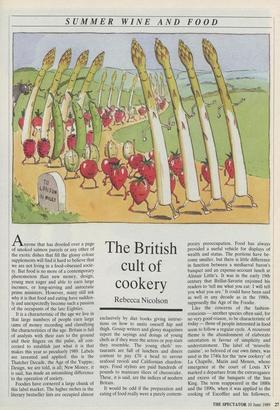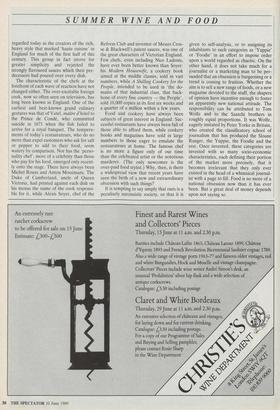SUMMER WINE AND FOOD
The British cult of cookery
Rebecca Nicolson
Anyone that has drooled over a page of smoked salmon parcels or any other of the exotic dishes that fill the glossy colour supplements will find it hard to believe that we are not living in a food-obsessed socie- ty. But food is no more of a contemporary phenomenon than new money, design, young men eager and able to earn large incomes, or long-serving and autocratic prime ministers. However, many still ask why it is that food and eating have sudden- ly and unexpectedly become such a passion of the occupants of the late Eighties.
It is a characteristic of the age we live in that large numbers of people earn large sums of money recording and classifying the characteristics of the age. Britain is full of analysts with their ears to the ground and their fingers on the pulse, all con- cerned to establish just what it is that makes this year so peculiarly 1989. Labels are invented and applied: this is the Thatcher Decade, the Age of the Yuppie; Design, we are told, is all; New Money, it is said, has made an astonishing difference to the operation of society.
Foodies have cornered a large chunk of this label market. The higher niches in the literary bestseller lists are occupied almost exclusively by diet books giving instruc- tions on how to smite oneself hip and thigh. Gossip writers and glossy magazines report the sayings and doings of young chefs as if they were the actors or pop stars they resemble. The young chefs' res- taurants are full of lunchers and diners content to pay £70 a head to savour seafood ravioli and Californian chardon- nays. Food stylists are paid hundreds of pounds to manicure slices of cheesecake. These, it is said, are the indices of modern Britain.
It would be odd if the preparation and eating of food really were a purely contem- porary preoccupation. Food has always provided a useful vehicle for displays of wealth and status. The portions have be- come smaller, but there is little difference in function between a mediaeval baron's banquet and an expense-account lunch at Alistair Little's. It was in the early 19th century that Brillat-Savarin enjoined his readers to 'tell me what you eat: I will tell you what you are.' It could have been said as well in any decade as in the 1980s, supposedly the Age of the Foodie.
Like the concerns of the fashion- conscious — another species often said, for no very good reason, to be characteristic of today — those of people interested in food seem to follow a regular cycle. A recurrent theme is the abandonment of elaborate ostentation in favour of simplicity and understatement. The label of 'nouvelle cuisine', so beloved of our own times, was used in the 1740s for the 'new cookery' of La Chapelle, Marin and Menon, whose emergence at the court of Louis XV marked a departure from the extravagance and excess of the banquets of the Sun King. The term reappeared in the 1880s and the 1890s, when it was applied to the cooking of Escoffier and his followers,
SUMMER WINE AND FOOD
regarded today as the creators of the rich, heavy style that marked 'haute cuisine' in England for much of the first half of this century. This group in fact strove for greater simplicity and rejected the strongly flavoured sauces which their pre- decessors had poured over every dish.
The characteristic of the chefs at the forefront of each wave of reaction have not changed either. The over-excitable foreign cook, now so often seen on television, has long been known in England. One of the earliest and best-known grand culinary gestures was that of Vatel, maitre d'hôtel to the Prince de Conde, who committed suicide in 1671 when the fish failed to arrive for a royal banquet. The tempera- ments of today's restaurateurs, who do no more than expel customers who ask for salt or pepper to add to their food, seem watery by comparison. Nor has the 'perso- nality chef , more of a celebrity than those who pay for his food, emerged only recent- ly onto the stage. There have always been Michel Rouxs and Anton Mossimans. The Duke of Cumberland, uncle of Queen Victoria, had printed against each dish on his menus the name of the cook responsi- ble for it, while Alexis Soyer, chef of the Reform Club and inventor of Messrs Cros- se & Blackwell's patent sauces, was one of the great characters of Victorian England. Few chefs, even including Nico Ladenis, have ever been better known than Soyer: his Modern Housewife, a cookery book aimed at the middle classes, sold in vast numbers, while A Shilling Cookery for the People, intended to be used in 'the do- mains of that industrial class, that back- bone of every fine country — the People', sold 10,000 copies in its first six weeks and a quarter of a million within a few years.
Food and cookery have always been subjects of great interest in England. Suc- cessful restaurants have always been full of those able to afford them, while cookery books and magazines have sold in large numbers to those eager to emulate the restaurateurs at home. The famous chef is no more a figure only of our time than the celebrated artist or the notorious murderer. (The only newcomer is the over-paid food stylist.) Why, then, is there a widespread view that recent years have seen the birth of a new and extraordinary obsession with such things?
It is tempting to say simply that ours is a peculiarly narcissistic society, or that it is given to self-analysis, or to assigning its inhabitants to such categories as 'Yuppie' or `Foodie' in an effort to impose order upon a world regarded as chaotic. On the other hand, it does not take much for a journalist or a marketing man to be per- suaded that an obsession is burgeoning or a trend is coming to fruition. Whether the aim is to sell a new range of foods, or a new magazine devoted to the stuff, the shapers of opinion have incentive enough to foster an apparently new national attitude. The responsibility can be attributed to Tom Wolfe and to the Saatchi brothers in roughly equal proportions. It was Wolfe, eagerly imitated by Peter Yorke in Britain, who created the classificatory school of journalism that has produced the Sloane Ranger, the Yuppie, the Foodie and the rest. Once invented, these categories are invested with so many socio-economic characteristics, each defining their portion of the market more precisely, that it becomes irrelevant that they only ever existed in the head of a whimsical journal- ist with a page to fill. Food is no more of a national obsession now than it has ever been. But a great deal of money depends upon not saying so.



























































 Previous page
Previous page